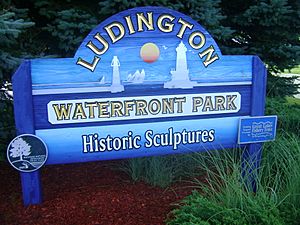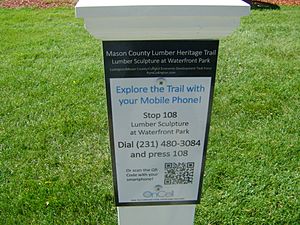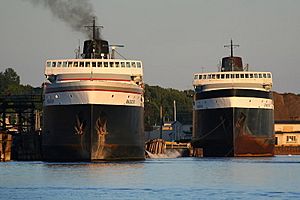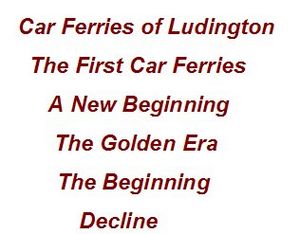Mason County Sculpture Trail facts for kids
The Mason County Sculpture Trail is a cool collection of outdoor art in Mason County, Michigan. It's located in Western and Northern Michigan. Started in 2012, the idea was to use these amazing sculptures to attract visitors and help the local economy.
Each sculpture has a name and tells a story about Mason County's past. Soon, you'll be able to scan a QR code with your phone at each sculpture. This will let you hear and see detailed information about the art! The plan is to have 25 sculptures across Mason County. This project helps make the area a fun place to visit for art and history. The Ludington Waterfront Park is a main spot, with nine bronze sculptures that are part of many downtown events.
The Sculpture Trail is one of five special trails in Mason County. The others are about farming, lumber history, maritime history (things about the water), and even quilt barns!
Contents
Sculptures
Waterfront Park
"The Spirit of Ludington"
This sculpture shows a sea captain looking out over the Ludington harbor. It honors Charles F. Conrad, who started the Lake Michigan Carferry Service. This service included the famous car ferry, the SS Badger.
Conrad bought the SS Badger and other ferries like the SS Spartan in 1991. He turned the Badger into a ferry that could carry both people and cars. The SS Badger has carried thousands of vehicles and passengers between Ludington, Michigan, and Manitowoc, Wisconsin, for many years.
Kristin Kokkin created this sculpture in 2000 and called it "The Sailor." It was the first sculpture placed at Ludington's waterfront park. It celebrates all the brave sailors and captains who worked on Lake Michigan.
"The Carferries of Ludington"
This sculpture is a huge, twelve-foot tall car ferry carrying cars. Many local people donated money to create this bronze artwork. Ludington has a long history with car ferries. The SS Badger, which still crosses Lake Michigan to Wisconsin every summer, is the last of these ferries. You can find several plaques around this 2007 sculpture by Tuck Langland that tell its history.
"Hooked on Hamlin"
Dedicated in July 2009, this sculpture shows a man and a boy fishing at nearby Hamlin Lake. It means a lot to people who grew up or vacationed there. The older man is helping the young boy with a fish. It's one of the most famous sculptures in Ludington. W. Stanley Proctor created this multi-piece bronze sculpture. He also made "Follow the Leader," another popular sculpture.
A plaque near the sculpture talks about how special Hamlin Lake is. It reminds us to protect the lake and its wildlife. It also shares an old Chinese proverb:
-
-
-
-
-
-
-
-
-
-
-
-
-
-
-
-
-
-
-
-
-
-
- A father may teach his son to fish, but a grandfather teaches him to fish for his dreams.
-
-
-
-
-
-
-
-
-
-
-
-
-
-
-
-
-
-
-
-
-
"Follow the Leader"
This sculpture shows five children and a puppy playing "follow the leader" across a stepping stone bridge. There's an empty stone in the middle, inviting you to step in and take a picture with the bronze children! The Don Birtwistle family bought and donated this sculpture to celebrate children.
"Follow the Leader" was the first sculpture for the Mason County Sculpture Trail. W. Stanley Proctor created it. He also made "Hooked on Hamlin" and "Double the Fun." It's a fun, interactive sculpture that kids love because they can play along with the bronze figures. It's a great photo opportunity!
"Ludington's Lumbering Era"
This eleven-foot bronze sculpture shows Michigan logging wheels and represents the lumber industry from the late 1800s and early 1900s. It shows a horse pulling logs, which was a common sight in Ludington back then. The lumber industry was very important to the Great Lakes region.
A large stone display nearby tells Ludington's history. It explains how James Ludington started a mill and lumber business in 1859. The town was named after him and other important lumber leaders. Ludington grew because of its lumber industry. A harbor was built so large amounts of lumber could be shipped out. At one point, fourteen mills were working around Pere Marquette Lake! People thought there was endless timber, but in less than forty years, most of the trees were cut down. The local lumber industry ended in 1917.
"The Dummy Train"
George Lundeen created this multi-piece bronze sculpture. It shows a lady and her children near train tracks on a platform. It represents the time when the Ludington railroad connected to the nearby resort of Epworth Heights. The residents of Epworth Heights bought and gave this sculpture to the city. The Ludington and Northern Railway was also called the Dummy Train. It carried thousands of passengers from Ludington to Epworth Heights during the summer from 1874 to 1919. The sculpture even uses real rails from the old railway!
"Fruits of Farming"
This bronze sculpture, created by George Lundeen, shows a man and a child sitting in a wheelbarrow. A woman stands nearby with a basket of fruit. In the middle, there's a sack of vegetables, a milk can, and a box of cherries. These items represent the farm products that have been important to Mason County's history. This was the ninth sculpture added to the Mason County Sculpture Trail in mid-2010. Lundeen also created "The Dummy Train" sculpture.
George Lundeen is a well-known sculptor. He has created many commissioned works for universities and cities. He lives and works in Loveland, Colorado.
"Put Me in Coach"
This bronze sculpture shows a crouched baseball player with a bat. It represents the Ludington Mariners, a semi-pro baseball team that played from 1912 to 1924. They played at Culver Park. Mark Lundeen created this sculpture, which was donated by the Anderson and Reed families.
The original Ludington Mariners team started in 1912. After some breaks, they were renamed the Ludington Tars. The team was brought back in 1993. Today, they play at White Pine Village outside Ludington. They sometimes play at Mackinac Island and Greenfield Village. The revived team and even the umpires dress in 1860s outfits and play by the old rules! Fans sometimes dress up too.
"The Reflections"
This seventeen-foot tall stainless steel sculpture is an abstract design of sails. It symbolizes the time when timber was carried by schooners (large sailing ships) from Ludington to other Great Lakes ports. It's the first sculpture boaters see when they come back into Ludington harbor from Lake Michigan. Russian-born sculptor Irina Koukhanova created this artwork. The Schoenherr family bought and donated it to the Waterfront Park.
Irina Koukhanova is a talented sculptor who has studied at several universities. She has shown her art in exhibitions all over the world.
This stainless steel sculpture, showing three sails, was the sixth one placed in the Ludington Waterfront Park. It was officially dedicated on August 12, 2006.
Mason County Fairgrounds
"Rearing Horse Memory Pole"
At the Mason County Fairgrounds, just east of downtown Ludington, you'll find "Rearing Horse Memory Pole." This wooden sculpture of a rearing horse was hand-carved by Scottville artist Craig Convissor. The Mason County Saddle Club bought it and donated it to the fairgrounds, where many horse shows happen each year. Thousands of people see this memorial at the fairgrounds entrance every spring, summer, and fall.
Ludington Public Library
"Flights of Learning"
In 2012, the new Keith Wilson Children's Center was added to the Ludington Public Library. At its front entrance, you'll see the bronze sculpture "Flights of Learning." John and Anita Wilson saw this sculpture at an art competition and decided to buy and donate it to the library. It was shown to the public in June 2012. Bryce Pettit created this seven-and-a-half-foot, 800-pound sculpture, which took him about six months to finish. The Keith Wilson Children's Center is named after John's father. Pettit said his sculpture represents what a library is all about.
The sculptor's eleven-year-old daughter was the model for the bronze sculpture. An open bronze book at the statue explains that parents help make the world better through their children. The community also helps by giving children a good education to become great citizens. The book is like a door to knowledge. The birds flying from it represent all the information you can learn from books.
Knowledge is set free and flies to new places, making people's lives richer and smarter through learning. Freedom comes from the chance to have "Flights of Learning." Different birds represent different types of knowledge:
- The wise owl represents science and math.
- The falcon represents history.
- The jay bird represents literature (stories and poems).
- The meadowlark represents the joy of music.
- The hummingbird represents fantasy and imagination.
- The tern shows the skills of art.
"Double the Fun"
This sculpture shows Sallie Peterson Ferguson reading to a young boy and a young girl. Sallie grew up on a fruit farm in Mason County. She was a very smart student and became a high school English teacher. She also helped start the Montessori School of Kalamazoo.
Because Sallie was a teacher, Dr. Bill Anderson, who leads the Mason County Cultural Economic Development Task Force, suggested putting this sculpture at the Ludington Public Library. You can find it in the Craig R. Rasmussen Outdoor Activity Area at the back of the library. W. Stanley Proctor created this sculpture. He also made "Hooked on Hamlin" and "Follow the Leader" for the Mason County Sculpture Trail.
Ludington State Park
"Community Cooperative"
A sculpture called "Community Cooperative" by Colette Pitcher shows small animals living together in an old tree, representing nature. John J. Helstrom paid for this sculpture. It's located across from the office of Ludington State Park on a walking path near the Sable River. The park manager said it shows the wildlife you might see in the park. It's a great addition to the Mason County Sculpture Trail, which started as a collection of public art at Ludington's Waterfront Park.
Mason County Sheriff's Office
"Helping Hand"
This sculpture at the Mason County Sheriff's Office was created by Colette Pitcher. Dr. Terry and Sandy Luxford bought and donated the sculpture. It shows how much the people of Mason County appreciate their law enforcement officers. Dr. Luxford has helped start law enforcement and nursing programs at West Shore Community College in Mason County, Michigan.
Maritime Heritage Park
The Maritime Heritage Park is an area south of the Loomis Street Boat Ramp, west of downtown Ludington. It has two sculptures that are part of the Mason County Sculpture Trail: "Abby" and "Sport Fishing."
"The Abbie"
"The Abbie" is a bronze bas-relief sculpture. It shows the last schooner (a type of sailing ship) built in Ludington in 1886 for a merchant named Rasmus Rasmussen. Sadly, during a storm on November 8, 1905, "The Abbie" was pushed ashore and wrecked near Portage Point. "The Abbie" was 88 feet long and had two masts. It was named after a Ludington postmaster's wife from the 1800s. The postmaster asked Rasmussen to name the ship after his wife, and in return, he would buy a windsock for the ship. So, the schooner was named "Abbie."
Jack Rasmussen and his wife Shirley donated the money for this sculpture. Jack is the grandson of Rasmus Rasmussen. Rasmus often sailed "The Abbie" between Ludington and Chicago, carrying goods. Tyson Snow created this bronze sculpture.
Sport Fishing
The "Sport Fishing" sculpture celebrates the popular sport of fishing in Ludington, Michigan. In the 1960s, Coho and Chinook Salmon were put into Lake Michigan. Fishermen started catching many of these fish in the fall of 1967. This fishing program helped tourism grow in Ludington. Carol Polston bought and dedicated this sculpture to her late husband, Barry, who loved fishing in Ludington and Northern Michigan. His boat was named "Trust me." Bryce Pettit created this sculpture. He also made "Flights of Learning" (mentioned above) at the Ludington library, which is also part of the Mason County Sculpture Trail.
 | May Edward Chinn |
 | Rebecca Cole |
 | Alexa Canady |
 | Dorothy Lavinia Brown |







